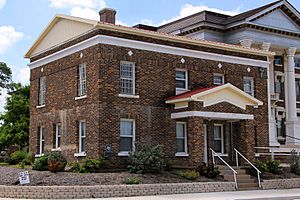Montague, Texas facts for kids
Quick facts for kids
Montague, Texas
|
|
|---|---|

Old Montague County Jail in Montague
|
|
| Country | United States |
| State | Texas |
| County | Montague |
| Named for | Daniel Montague |
| Area | |
| • Total | 1.276 sq mi (3.30 km2) |
| • Land | 1.276 sq mi (3.30 km2) |
| • Water | 0 sq mi (0 km2) |
| Elevation | 1,073 ft (327 m) |
| Population
(2010)
|
|
| • Total | 304 |
| • Density | 238.2/sq mi (91.99/km2) |
| Time zone | UTC-6 (Central (CST)) |
| • Summer (DST) | UTC-5 (CDT) |
| ZIP Code |
76251
|
| Area code(s) | 940 |
| GNIS feature ID | 1363054 |
Montague (pronounced MON-tayg) is a small community in Montague County, Texas, United States. It is known as a census-designated place, which means it's an area identified by the U.S. Census Bureau for statistical purposes. Montague is also the main town, or county seat, of Montague County. In 2010, about 304 people lived there.
Contents
Where is Montague Located?
Montague is found in the middle of Montague County, Texas. It sits near where two main roads, Texas State Highway 59 and Texas State Highway 175, cross paths.
This community is about 80 miles (129 km) northwest of a big city called Fort Worth. It's also about 60 miles (97 km) southeast of Wichita Falls. If you travel 11 miles (18 km) northeast, you will reach the town of Bowie.
The Story of Montague: A Look Back in Time
Montague was started in 1858. The land for the town, which was 160 acres (0.65 km2), was given by the state of Texas. The community was named after Daniel Montague, who was an early land surveyor in the area. A post office opened in Montague in 1860, helping people send and receive mail.
Early Growth and Challenges
By 1880, about 400 people called Montague home. The town had five businesses, three churches, and a school. It also had the only flour and grist mills in the whole county. Montague officially became an incorporated town in 1886. This meant it had its own local government.
However, the town faced a big challenge. In 1886, two men, W.A. Morris and C.C. White, tried to raise money to build a train line connecting Montague to Bowie. They could not get enough funds, so the railroad never reached Montague. Because it was not connected by train, the town became isolated and did not grow as much as other places. In 1900, the people of Montague voted to stop being an incorporated town.
Changes Over the Years
In 1915, about 300 people lived in Montague. This number dropped to its lowest point of 284 residents in 1947. After World War II, new highways were built. More people and goods started traveling by cars and trucks. This helped Montague begin to recover slowly. The community started growing again by the 1970s. In both 1990 and 2000, around 400 people lived in the area.
Who Lives in Montague?
The number of people living in Montague has changed over the years. In 2010, there were 304 residents. By the 2020 United States census, the population was 261 people. At that time, there were 90 households and 60 families living in the community.
Learning in Montague
Children in Montague attend public schools run by the Montague Independent School District. This district teaches students from pre-kindergarten up to eighth grade. For high school, students in ninth through twelfth grade go to schools in nearby towns like Nocona or Bowie.
Montague's Weather
The weather in Montague has hot and humid summers. The winters are usually mild to cool. According to the Köppen Climate Classification system, Montague has a "humid subtropical climate." This means it gets a good amount of rain throughout the year and has warm temperatures.
Images for kids
See also
 In Spanish: Montague (Texas) para niños
In Spanish: Montague (Texas) para niños



